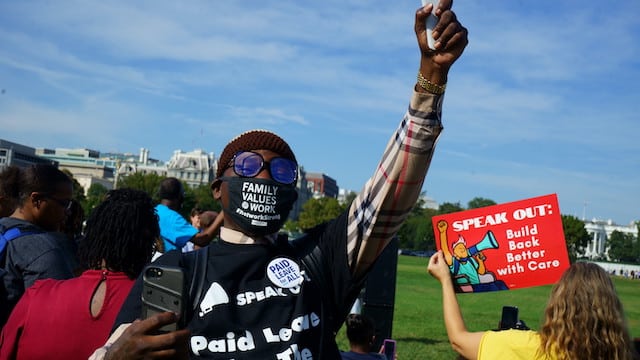Equal Pay Day: Why Black women shouldn’t have to work eight extra months to earn the same as white men

By Rep. Robin Kelly (IL) and Cherita Ellens of Women Employed
This month we marked Black Women’s Equal Pay Day, the day when Black women’s earnings catch up with those of non-Hispanic white men. The wage gap of $0.63 means that it takes Black women in America until August to earn what non-Hispanic white men finished making on December 31 of the prior year. For Black mothers, the wage gap is even worse, as they receive only $0.50 for every dollar non-Hispanic white fathers are paid.
Beyond the obvious injustice of unequal pay for Black women’s equal work in this country, we know, as evidenced throughout the COVID-19 pandemic, that Black women are doing the work our country desperately relies on to keep moving. And, while we call their work essential, we don’t value the labor of the women in these essential roles.
The story of Black women carrying out the essential work of this nation is clearly exemplified in caregiving. Roughly 1 in 5 child care workers are Black women. Black women do the essential work to ensure the next generation of children can grow, learn, and thrive, and that the thousands of Americans who turn 65 every day will have the care they deserve to age safely, and with dignity.
Yet the pay gap Black women experience every day has a particularly harmful impact on the American workforce. Black women in the child care sector make $0.78 less per hour than their white colleagues, and poverty rates are more than 50% higher for them compared to other female child care workers.
As families sheltered at home during the COVID-19 pandemic,parents also tried to telework effectively while their children completed their schoolwork remotely. Americans everywhere felt the impact of not having access to affordable caregiving. We cannot afford to wait any longer to invest in our essential caregiving infrastructure, and especially invest in the women of color who do this work for all families.
Investing in the care economy is critical for helping to end the cycle of unequal pay for Black women’s work. Investing in child care specifically would boost the wages of the women of color serving as the backbone of the early education sector, with Black child care workers seeing their wages increase by 22 percent.
Lack of affordable access to care for their loved ones creates hardship for Black women across the entire workforce trying to make ends meet within inflexible work arrangements and lower-wage jobs. As the pandemic began, more than 2 in 3 Black mothers (65.9 percent) were the primary or sole breadwinners for their families. Yet in all but two states in the U.S. last year, the average costs of child care exceeded 20% of Black women’s median annual earnings.
Investing in child care would increase the accessibility and affordability of child care for all families, and doing so would have an outsized impact on Black mothers in particular, who on average would see a net increase in their income of more than $100,000 over the course of their lifetime. The reduction in the wage gap for Black women without a high school degree alone could be as high as 25 percent.
On Black Women’s Equal Pay Day this month, we must recognize that the work we all depend on for our economy to thrive is being done by Black women who are not being compensated fairly nor equitably for it. We must commit to ending caregiving penalties for women, especially Black women, and workers in low wage roles by investing in accessible and affordable child, elder and disability care, and by creating a federal paid leave program. Making these crucial investments in our care infrastructure means parents can get to work building our economy back better.